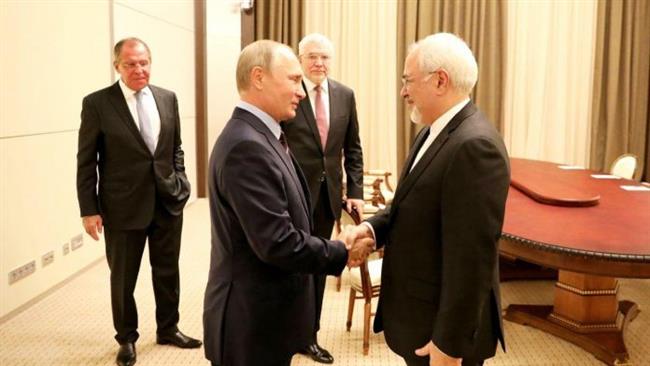Iran’s Foreign Minister Mohammad Javad Zarif visited Russian President Vladimir Putin on Wednesday for discussions on the July 2015 nuclear deal and on the Syrian crisis.
Zarif travelled to Sochi in southern Russia as Iran tries to detach other powers from US sanctions and pressure on Tehran around and beyond the nuclear agreement with the 5+1 Powers (US, Russia, UK, France, Germany, and China).
Facing further damage to its hopes of economic recovery, after the US Congress imposed more restrictions, Iranian leaders including President Rouhani have called on European powers to reject the American line and develop their trade and investment links with the Islamic Republic.
Zarif said after the Putin meeting, which also included Russian Foreign Minister Sergei Lavrov, that the discussion was “substantial and positive”:
The Islamic Republic of Iran has so far fulfilled all its commitments concerning the JCPOA [Joint Comprehensive Plan of Action], but unfortunately certain sides have not stayed committed as they should. Today, we stress that this is an international and multilateral agreement and that all sides should adhere to it.
Zarif also referred to conversation about Syria, where both Russia and Iran are essential allies of the Assad regime.
Another round of political talks are forthcoming in the Kazakh capital Astana. The position of pro-Assad forces is strengthening, with surrenders of some opposition areas and advances against the Islamic State. However, questions remain over whether the Assad regime will be allowed to pursue its quest for the total defeat of opponents. Russia has instead pursued “de-escalation zones” from the north to the south, raising doubts over whether pro-Assad forces can pursue the conquest of Idlib Province in northwest Syria.
Russia and Iran also face the issue of a de facto Syrian Kurdish autonomy: the Kurdish militia YPG, in the Syrian Democratic Forces, has taken over more ISIS territory and is pursuing the final capture of the city of Raqqa.

